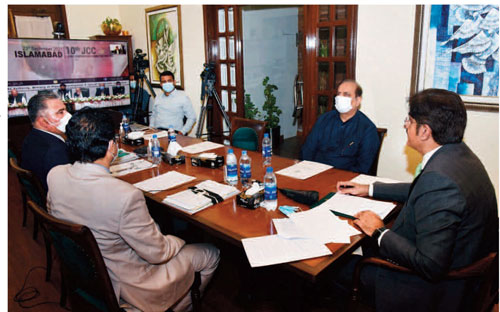Sindh Chief Minister Syed Murad Ali Shah said that under CPEC the next level of engagement on Thar Coal should be considered for moving from mine-mouth power generation to coal transportation to potential sites.
“Great potential exists for connecting Thar coal with Keti Bandar and develop Keti Bandar Port for coal blending, power generation and the rail connectivity between Islamkot and Mirpurkhas would help in replacing power plants operating on imported coal with much cheaper Thar coal thus reducing the unnerving energy circular debt.”
This he said while addressing a CPEC-related 10th Joint Cooperation Committee (JCC) meeting held in Islamabad through video link on Thursday. Minister of Energy Imtiaz Shaikh and Secretary Energy Abu Bakar also attended the meeting.
The CM said that his government has been working closely with Chinese on Thar Coal-based power projects under CPEC and “we believe that it’s about time to move to the next level by employing Thar coal for coal-to-gas and coal-to-liquid conversion, the CM said and added this conversion was crucial for reducing Energy sector circular debt, ensuring Pakistan’s food security through fertilizer production, and ensuring energy needs of the country for economic growth.
Mr Shah said that he had discussed these aspects aspects in 9th JCC meeting, and it was high time to devise ways and means to implement and capitalize on these potentials, including Coal to Liquid Engineering Plant based on Thar coal at Thar Block-IV for Coal gasification to Fertilizer Projects.
Murad Ali Shah said that the next level of engagement on Thar Coal should be considered to move from mine-mouth power generation to coal transportation to potential sites.
“Great potential exists for connecting Thar coal with Keti Bandar and develop Keti Bandar Port for coal blending, power generation,” he said and added similarly, Rail connectivity between Islamkot and Mirpurkhas would help in replacing power plants operating on imported coal with much cheaper Thar coal thus reducing the unnerving energy circular debt.
Talking about Karachi Circular Railway, the CM said that the KCR has been part of all JCCs and it was an integral part of Karachi Transportation Plan.
“Different Bus Rapid Transport Systems, which are at various levels of implementations, will improve connectivity but without KCR loop the whole idea remains incomplete,” he said and requested that in the JCC, requisite aassurances from the government of Pakistan and Chinese government should be taken so that the KCR was kick-started.
Mr Shah said that the socio-economic zone of Dhabeji located in proximity to Port Qasim would be ready for industrial estate development by August 2021.
“We are keen for engaging with Chinese investors for investment in already identified sectors of Steel, Automobile Manufacturing, Automobile Vendors, Electronic Manufacturing and Assembly, Food Processing, Chemical & Pharmaceutical, Textile and= Garments,” he said and added “we are committed to substantially increase the area from 1500 acres for facilitating Chinese investment and industrial relocation”.
As a follow-up on JCC, he requested the Sindh Chambers, Chinese Investors and Entrepreneurs exchanges to work on these potentials.
According to Mr Shah together, Pakistan and China are entering the next phase of China Pakistan Economic Corridor (CPEC), with greater emphasis on socio economic uplift, poverty alleviation, agricultural cooperation and industrial development.
He said that his government has already shared 15 projects in three Batches for Socio-economic Development under CPEC and he hoped that these projects would be kickstarted soon.
“However, we are keen to deepen our engagement in areas of agriculture productivity, agriculture and livestock research, and agro based industrialization,” he said and added onee specific area for agriculture cooperation was Biosaline agriculture for coastal districts of Sindh.
He requested the Chinese government to work with agriculture and livestock departments, growers, and Chambers representatives for their visits to China and work on specifics of engagements.
He thanked Ministry of Planning, Development, & Special Initiative and NDRC for convening the JCC and hoped the meeting would help in further strengthening the bond between two brotherly countries.










